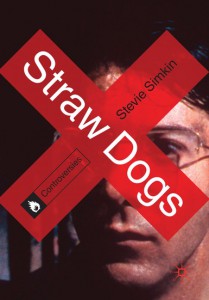Straw Dogs
By Stevie Simkin. Controversies series. (Palgrave Macmillan, September 2011). 155 pages. ISBN 978-0-230-29670-1 (paperback). Price: £12.99
 About the Author: Dr Sheldon Hall is a Senior Lecturer in Stage and Screen Studies at Sheffield Hallam University. He is the author, with Steve Neale, of Epics, Spectacles and Blockbusters: a Hollywood History (Wayne State University Press, 2010) and among the articles he has contributed to books and journals is a chapter on Straw Dogs in Seventies British Cinema (ed. Robert Shail, BFI/Palgrave Macmillan, 2008).
About the Author: Dr Sheldon Hall is a Senior Lecturer in Stage and Screen Studies at Sheffield Hallam University. He is the author, with Steve Neale, of Epics, Spectacles and Blockbusters: a Hollywood History (Wayne State University Press, 2010) and among the articles he has contributed to books and journals is a chapter on Straw Dogs in Seventies British Cinema (ed. Robert Shail, BFI/Palgrave Macmillan, 2008).
Always controversial, and therefore fully justifying its place as a subject in this new series of monographs, Sam Peckinpah’s Straw Dogs (1971) is most often described now as ‘problematic’. The film has provoked strong reactions – both in its favour and, more often, against – ever since its initial release. Many early reviewers, especially in the UK where it was shot, were appalled by what they saw as its excessive, excitatory violence. Feminist critics have seen it as an endorsement of the masculine territorial imperative and the myth that women ‘really’ want to be raped. Specific concerns over the impact of the film’s crucial dual-rape scene led to its being reedited by censors on both sides of the Atlantic and later denied certification for UK home video release for fifteen years. Yet Straw Dogs also has its defenders (including the present reviewer), who have sought to place the film within the context of Peckinpah’s work and to explore appreciatively its formal brilliance and thematic richness, while also acknowledging its troubling ambivalence with regard to both gender politics and the depiction of violence (especially sexual violence).
 Stevie Simkin, one of the Controversies series’ co-editors (with Julian Petley), picks his way through this potential minefield with exceptional tact, skill and thoroughness. The book is divided into five sections, with the first and longest providing an unprecedentedly detailed production history. Here and elsewhere, Simkin draws extensively on primary documents held in the Sam Peckinpah Collection at the Margaret Herrick Library in Los Angeles. These include correspondence between Peckinpah and his collaborators, script drafts and cutting notes, from which Simkin is able to construct a revealing picture of both the filmmakers’ creative process and the practical and commercial pressures attendant upon it. This section also includes a persuasive account of the cultural and political context in which Straw Dogs appeared, particularly that of the Vietnam War. Primary sources are further drawn upon in the next section, which traces in minute detail a chronology of the film’s censorship history. This account benefits particularly from access to the files of the British Board of Film Classification, showing the development of ideological debates over the morality of the film’s violence, as well as concerns over its likely effect on viewers, which informed successive regimes’ decisions over whether to classify the film for home consumption.
Stevie Simkin, one of the Controversies series’ co-editors (with Julian Petley), picks his way through this potential minefield with exceptional tact, skill and thoroughness. The book is divided into five sections, with the first and longest providing an unprecedentedly detailed production history. Here and elsewhere, Simkin draws extensively on primary documents held in the Sam Peckinpah Collection at the Margaret Herrick Library in Los Angeles. These include correspondence between Peckinpah and his collaborators, script drafts and cutting notes, from which Simkin is able to construct a revealing picture of both the filmmakers’ creative process and the practical and commercial pressures attendant upon it. This section also includes a persuasive account of the cultural and political context in which Straw Dogs appeared, particularly that of the Vietnam War. Primary sources are further drawn upon in the next section, which traces in minute detail a chronology of the film’s censorship history. This account benefits particularly from access to the files of the British Board of Film Classification, showing the development of ideological debates over the morality of the film’s violence, as well as concerns over its likely effect on viewers, which informed successive regimes’ decisions over whether to classify the film for home consumption.
 Learning on Screen
Learning on Screen